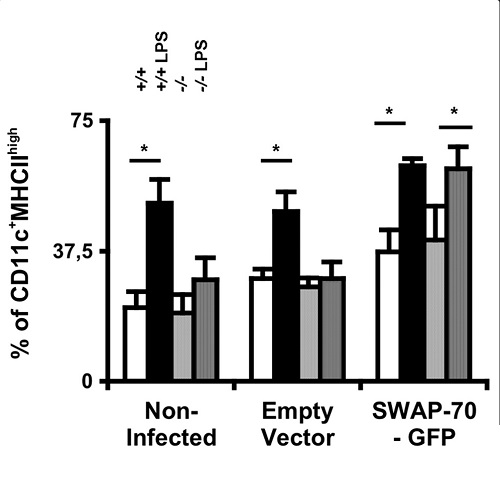SWAP-70 regulates RhoA/RhoB-dependent MHCII surface localization in dendritic cells.
Stimulated dendritic cells (DCs) mature and migrate to lymphoid organs to prime naive T cells. DC maturation augments antigen-presentation capacity of DCs by increasing peptide loading, half-life, and cell surface localization of MHC molecules. Activated SWAP-70(-/-) DCs fail to properly localize MHCII molecules in the plasma membrane, are strongly impaired in T-cell activation, and are altered in F-actin rearrangement. MHCII synthesis, invariant chain removal, and MHCII internalization, however, are unaffected. MHCII surface localization is known to require RhoGTPases. Surprisingly, SWAP70, hitherto known to bind F-actin and Rac, also binds RhoA-GTP. In SWAP-70(-/-) DCs, RhoA and RhoB are stimulus-independent and constitutively active. Surface localization of MHCII molecules and T-cell activation can be restored by blocking RhoA and RhoB before but not during DC activation. Thus, contrasting positive regulation of Rac, SWAP-70 negatively regulates RhoA and-indirectly-RhoB, preventing premature RhoA/RhoB activation. Through RhoA/RhoB regulation, SWAP-70 defines a new pathway to control surface localization of MHCII, a critical element in DC-dependent immune responses.

- Blood 2009 Feb 12;113(7):1474-82
- 2009
- Cell Biology
- 18802007
- PubMed
Enabled by:
